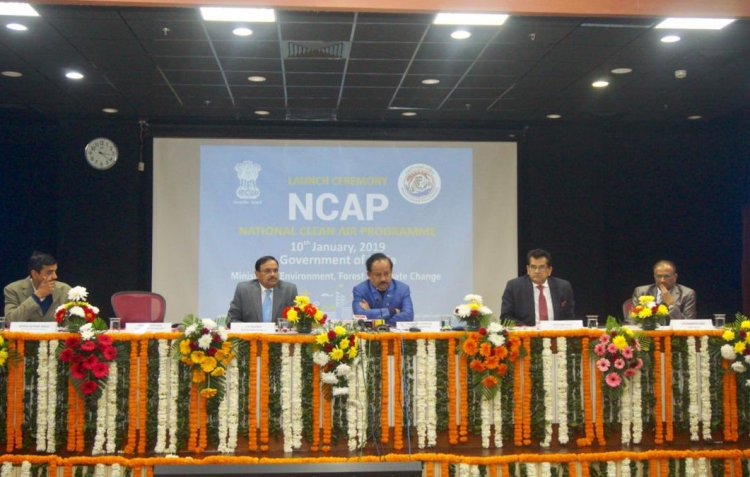National Clean Air Programme launched by Dr Harsh Vardhan in New Delhi
"Collaborative and participatory approach involving relevant Central Ministries, State Governments, local bodies and other Stakeholders with focus on all sources of pollution forms the crux of the Programme." said the Union Environment Minister.

- Country:
- India
Air pollution is one of the biggest global environmental challenges of today. A time-bound national level strategy for pan India implementation to tackle the increasing air pollution problem across the country in a comprehensive manner in the form of National Clean Air Programme(NCAP) was today launched by Union Minister of Environment, Forest and Climate Change, Dr Harsh Vardhan in New Delhi.
"Collaborative and participatory approach involving relevant Central Ministries, State Governments, local bodies and other Stakeholders with focus on all sources of pollution forms the crux of the Programme." said the Union Environment Minister. Dr Harsh Vardhan further informed that taking into account the available international experiences and national studies, the tentative national level target of 20%–30% reduction of PM2.5 and PM10 concentration by 2024 is proposed under the NCAP taking 2017 as the base year for the comparison of concentration. "Overall objective of the NCAP is comprehensive mitigation actions for prevention, control and abatement of air pollution besides augmenting the air quality monitoring network across the country and strengthening the awareness and capacity building activities." the minister further added.
CEO NITI Aayog, Shri Amitabh Kant who was also present at the launch said that NCAP is a path-breaking initiative and one of the most critical and most significant programmes as it addresses one of the most alarming challenges of urbanization i.e. air pollution. "Today cities occupy just 3% of the land, but contribute to 82% of GDP and responsible for 78% of Carbon dioxide emissions; cities though are engines of growth and equity but they have to be sustainable and it is in this context that NCAP being a very inclusive program holds special relevance," said Shri Kant.
The NCAP will be a mid-term, five-year action plan with 2019 as the first year. However, the international experiences and national studies indicate that significant outcome in terms of air pollution initiatives are visible only in the long-term, and hence the programme may be further extended to a longer time horizon after a mid-term review of the outcomes. The approach for NCAP includes collaborative, multi-scale and cross-sectoral coordination between the relevant central ministries, state governments and local bodies. The dovetailing of the existing policies and programmes including the National Action Plan on Climate Change (NAPCC) and other initiatives of the Government of India in reference to climate change will be done while execution of NCAP.
There will be the use of the Smart Cities program to launch the NCAP in the 43 smart cities falling in the list of the 102 non-attainment cities. The NCAP is envisaged to be dynamic and will continue to evolve based on the additional scientific and technical information as they emerge. The NCAP will be institutionalized by respective ministries and will be organized through inter-sectoral groups, which include, Ministry of Road Transport and Highway, Ministry of Petroleum and Natural Gas, Ministry of New and Renewable Energy, Ministry of Heavy Industry, Ministry of Housing and Urban Affairs, Ministry of Agriculture, Ministry of Health, NITI Aayog, CPCB, experts from the industry, academia, and civil society. The program will partner with multilateral and bilateral international organizations, and philanthropic foundations and leading technical institutions to achieve its outcomes.
City-specific action plans are being formulated for 102 non-attainment cities identified for implementing mitigation actions under NCAP. Cities have already prepared action plans in consultation with CPCB. Institutional Framework at Centre and State Level comprising of Apex Committee at the Ministry of Environment Forest and Climate Change in the Centre and at Chief Secretary Level in the States are to be constituted.
In addition, sectoral working groups, national level Project Monitoring Unit, Project Implementation Unit, state-level project monitoring unit, city level review committee under the Municipal Commissioner and DM level Committee in the Districts are to be constituted under NCAP for effective implementation and success of the Programme.
Other features of NCAP include an increasing number of monitoring stations in the country including rural monitoring stations, technology support, emphasis on awareness and capacity building initiatives, setting up of certification agencies for monitoring equipment, source apportionment studies, emphasis on enforcement, specific sectoral interventions etc.
The launch ceremony was attended by more than 150 participants representing central and state governments, industries, national & international organizations, Universities and research institutes from across the country.
ALSO READ
Delhi's Air Quality Crisis: Capital Shrouded in Toxic Smog
Delhi's Air Quality Crisis: Crackdown on Polluters and Violators Intensifies
Union Environment Minister Seeks Rapid Action: Air Quality to Improve in Delhi-NCR
Delhi's Air Quality Crisis: Fog and Pollution Plague the Capital
Delhi's Air Quality Challenge: A Push for Comprehensive Solutions










